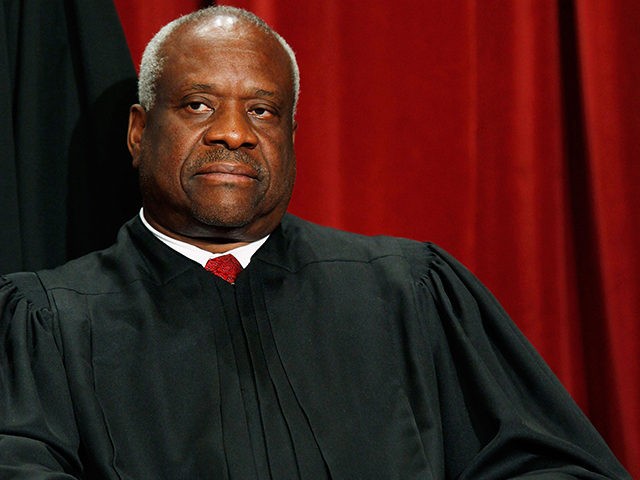Bang / Guns
See other Bang / Guns Articles
Title: Clarence Thomas: ‘Improbable’ that 2nd Amendment Only Protects Carrying a Gun in Your Home
Source:
Breitbart
URL Source: http://www.breitbart.com/california ... nt-protects-carrying-gun-home/
Published: Jun 27, 2017
Author: Awr Hawkins
Post Date: 2017-06-27 18:20:53 by cranky
Keywords: None
Views: 1187
Comments: 2
In his dissent to the Supreme Court of the United State’s (SCOTUS) June 26 announcement that it would not review Peruta v. California, Justice Clarence Thomas contended he finds it “improbable” that the Second Amendment only protects a right to carry a gun in one’s own home. Peruta has become on the focal point of opposition to California’s “good cause” requirement for issuance of concealed carry permits. On January 12, 2017, Breitbart News reported that SCOTUS was asked to review Peruta in hopes of securing a ruling in support of the fundamental right to bear arms. Petitioners specifically wanted SCOTUS to rule “whether the Second Amendment entitles ordinary, law-abiding citizens to carry handguns outside the home for self-defense in some manner, including concealed carry when open carry is forbidden by state law.” But on June 26, SCOTUS announced it would not review the case, thereby leaving the “good cause” requirement for concealed carry in place. Cornell published the text of Thomas’s dissent, in which he warned that SCOTUS is treating the Second Amendment “as a disfavored right.” He wrote that “the Constitution does not rank certain rights above others;” therefore, SCOTUS ought not adopt a hierarchical ranking for them either. Moreover, Thomas stressed that SCOTUS missed a perfect opportunity to rule “definitively” to a Ninth Circuit en banc decision that cut against previous SCOTUS rulings and precedent. He wrote: [SCOTUS] has already suggested that the Second Amendment protects the right to carry firearms in public in some fashion. As we explained in Heller, to “bear arms” means to “ ‘wear, bear, or carry upon the person or in the clothing or in a pocket, for the purpose of being armed and ready for offensive or defensive action in a case of conflict with another person.’ ” …The most natural reading of this definition encompasses public carry. Yet the Ninth Circuit ruled that “the Second Amendment does not preserve or protect a right of a member of the general public to carry concealed firearms in public.” Taken to its logical conclusion, the Ninth Circuit’s ruling means the right to keep and bear arms is limited to one’s home, and this is a ruling Justice Thomas rejects. He wrote, “I find it extremely improbable that the Framers understood the Second Amendment to protect little more than carrying a gun from the bedroom to the kitchen.” Are First Amendment protections limited to the confines of one’s home? Are Fourth, Fifth, or Sixth Amendment protections so limited as well? Thomas’s point is that they are not–that natural rights are ours wherever we are as we go through our day. By refusing to review a ruling that limited Second Amendment rights to one’s abode, Thomas believes SCOTUS displayed a tendency to treat the Second Amendment “as a disfavored right.” Justice Neil Gorsuch joined Thomas in dissent. AWR Hawkins is the Second Amendment columnist for Breitbart News and host of Bullets with AWR Hawkins, a Breitbart News podcast. He is also the political analyst for Armed American Radio. Follow him on Twitter: @AWRHawkins. Reach him directly at awrhawkins@breitbart.com. 
Post Comment Private Reply Ignore Thread
Top • Page Up • Full Thread • Page Down • Bottom/Latest
#1. To: cranky (#0)
yeah free speech In The shower - baThroom ThaT makes sense Love If you ... don't use exclamation points --- you should't be typeing ! Commas - semicolons - question marks are for girlie boys !
Taken to its logical conclusion, the Ninth Circuit’s ruling means the right to keep and bear arms is limited to one’s home, and this is a ruling Justice Thomas rejects. He wrote, “I find it extremely improbable that the Framers understood the Second Amendment to protect little more than carrying a gun from the bedroom to the kitchen.” No, it just means that the right recognized by the 2nd Amendment to preexist in the colonies, was the British common law right to keep and bear arms. It did not guarantee a right to concealed carry. It should be read to prohibit a state from banning both concealed and open carry. http://avalon.law.yale.edu/18th_century/blackstone_bk1ch1.asp Blackstone's Commentaries on the Laws of England Book the First - Chapter the First: Of the Absolute Rights of Individuals State laws against the concealed carry of knives and guns were passed in 1813 by Kentucky and Louisiana; by Indiana in 1820.
boris
#2. To: cranky (#0)
Yet the Ninth Circuit ruled that “the Second Amendment does not preserve or protect a right of a member of the general public to carry concealed firearms in public.”
5. THE fifth and last auxiliary right of the subject, that I shall at present mention, is that of having arms for their defence, suitable to their condition and degree, and such as are allowed by law. Which is also declared by the same statute 1 W. & M. ft. 2. c. 2. and is indeed a public allowance, under due restrictions, of the natural right of resistance and self-preservation, when the sanctions of society and laws are found insufficient to restrain the violence of oppression.
Top • Page Up • Full Thread • Page Down • Bottom/Latest
[Home] [Headlines] [Latest Articles] [Latest Comments] [Post] [Mail] [Sign-in] [Setup] [Help] [Register]
